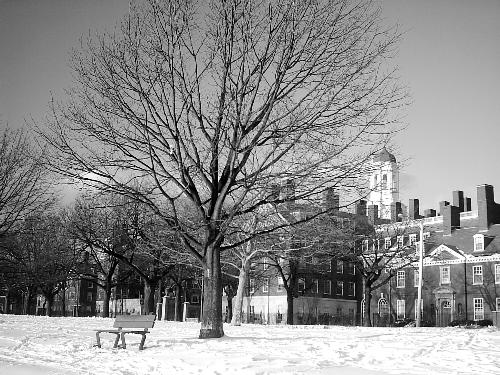
News
Progressive Labor Party Organizes Solidarity March With Harvard Yard Encampment

News
Encampment Protesters Briefly Raise 3 Palestinian Flags Over Harvard Yard

News
Mayor Wu Cancels Harvard Event After Affinity Groups Withdraw Over Emerson Encampment Police Response

News
Harvard Yard To Remain Indefinitely Closed Amid Encampment

News
HUPD Chief Says Harvard Yard Encampment is Peaceful, Defends Students’ Right to Protest
The Same River Twice
What happens when one meets oneself?

ON THE CHARLES RIVER—My favorite short story from my favorite author takes place on a bench on the Charles’ shore. I sought to experience summer genuinely. Sitting on a—the—bench, I took a break from editing others’ words.
The tale is by and about literary legend Jorge Luis Borges. Sitting in Cambridge, Borges encounters a younger version of himself who imagines he has stumbled upon the Rhône’s shore in Geneva. He then recalls Greek philosopher Heraclitus explaining how constant change makes it impossible to bathe twice in the same river. Four decades apart, the two Borges are utterly different men.
The peace of the slowly drifting Charles contrasted the SUVs rushing on the other side. Everything seems to move faster nowadays: letters gave way BlackBerrys, caravels to Airbuses, and courting seasons to one-night-stands. A sort of immaterial internal combustion engine must have changed the world faster than time changed Borges.
History—personal and collective—has sped up, and the battle for how the past is remembered has intensified. A historian might fight it for the dismembered British Empire, Christians for their often misinterpreted savior, and a bored girlfriend for the idyllic first date. But that old cliché about controlling the past only to control the present requires a radical shift. Episodes like the “re-burial” of revolutionary martyr Imre Nagy in Hungary make it so. Nagy, who was denounced by the pro-Soviet communist regime for decades, was re-buried by nationalist Hungarians in 1989 as a hero. Controlling the present in order to rewrite the past is the rule of the day; it’s our way of ensuring our memories, rather than someone else’s, will become “official history.” So Oscar Wilde was right: memory is all we have left when fleeting youth escapes through the window.
During my June in Europe, a continent often associated with the past as if it were an incurable malady, I was amazed by a widespread nostalgia emanating from popular culture. In a very short span of time, artistic expressions across languages and latitudes have returned to the revolutionary afternoons of May ’68—when a French student protest regarding university visitation rules erupted into a national firestorm.
In England, newcomer singer Sandi Thom managed to bring “I Wish I Was a Punk Rocker” to the top of the June charts. In the song, she regrets having been born “too late, to a world that does not care.” In contrast, in “’77 and ’69, revolution was in the air.” Only then “ignorance could still be bliss,” “accountants didn’t rule the world,” and “the media couldn’t buy your soul.”
France has revisited the period more cyclically, even if we ignore the easy comparison with this March’s student protests. Iconic film directors like Philippe Garrel and Bernardo Bertolucci have returned to the period on their sets, shooting Les Amants réguliers (2005) and The Dreamers (2004) respectively. Quite ironically, for last winter’s season, the ubiquitous LeClerc retail store—think Gap with French accent—chose ’68 as the theme for their ad campaign.
And further south, in Spain, songwriter Ismael Serrano became a star not so long ago with a song begging his father to retell the “beautiful story” of ’68: “sweet urban guerrillas in Oxford pants and girls in miniskirts.” In it, he yearns for the days when, amidst the myriad mistakes, raised fists, and barricades, youth took a stand against the social, political and economic establishment of the time. But looking at it from today, “how far away that Paris, Sartre, and St. Denis!”
In the story on the Charles, the two Borges are finally reconciled when the older recites a famous line by Victor Hugo. Popular culture remains memory’s best compass in the river of time—connecting each of us to our other selves. We need to understand popular expressions always, in order to judge where we’ll personally stand on the re-writes every generation makes.
As Spanish philosopher Ortega y Gasset explained, all that really differentiates us from apes is the pile of human errors we call “History.” And yet a sort of historic principle of uncertainty rules what each of us defines as “mistake.”
So was ’68 the best or worst from our parent’s generation? Was it Austerlitz or Waterloo? Should we focus on the dream of better opportunities or the delirium courtesy of LSD? Regardless, it remains forever useful to remember how our parents remembered our grandparents.
In the pages of History, as Borges himself says, memorable moments need no memorable quotations. But the struggle for memory inevitably adds them, as a good editor in search of elusive imperishability. Our times might have faster rivers, but Heraclitus will forever be the same: to recognize us in the future, we only need to remember (or re-write) precisely how we looked like in the past.
Pierpaolo Barbieri ’09, a Crimson editorial editor, is a history concentrator in Eliot House. He is currently on the Charles, where he wrote this piece, trying to remember how to write about forgetting.
Want to keep up with breaking news? Subscribe to our email newsletter.
